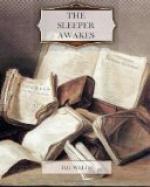He turned sharply to introduce the Surveyor-General of the Public Schools. This person was a willowy figure in a blue-grey academic gown, he beamed down upon Graham through pince-nez of a Victorian pattern, and illustrated his remarks by gestures of a beautifully manicured hand. Graham was immediately interested in this gentleman’s functions, and asked him a number of singularly direct questions. The Surveyor-General seemed quietly amused at the Master’s fundamental bluntness. He was a little vague as to the monopoly of education his Company possessed; it was done by contract with the syndicate that ran the numerous London Municipalities, but he waxed enthusiastic over educational progress since the Victorian times. “We have conquered Cram,” he said, “completely conquered Cram—there is not an examination left in the world. Aren’t you glad?”
“How do you get the work done?” asked Graham.
“We make it attractive—as attractive as possible. And if it does not attract then—we let it go. We cover an immense field.”
He proceeded to details, and they had a lengthy conversation. Graham learnt that University Extension still existed in a modified form. “There is a certain type of girl, for example,” said the Surveyor-General, dilating with a sense of his usefulness, “with a perfect passion for severe studies—when they are not too difficult you know. We cater for them by the thousand. At this moment,” he said with a Napoleonic touch, “nearly five hundred phonographs are lecturing in different parts of London on the influence exercised by Plato and Swift on the love affairs of Shelley, Hazlitt, and Burns. And afterwards they write essays on the lectures, and the names in order of merit are put in conspicuous places. You see how your little germ has grown? The illiterate middle-class of your days has quite passed away.”
“About the public elementary schools,” said Graham. “Do you control them?”
The Surveyor-General did, “entirely.” Now, Graham, in his later democratic days, had taken a keen interest in these and his questioning quickened. Certain casual phrases that had fallen from the old man with whom he had talked in the darkness recurred to him. The Surveyor-General, in effect, endorsed the old man’s words. “We try and make the elementary schools very pleasant for the little children. They will have to work so soon. Just a few simple principles—obedience—industry.”
“You teach them very little?”
“Why should we? It only leads to trouble and discontent. We amuse them. Even as it is—there are troubles—agitations. Where the labourers get the ideas, one cannot tell. They tell one another. There are socialistic dreams—anarchy even! Agitators will get to work among them. I take it—I have always taken it—that my foremost duty is to fight against popular discontent. Why should people be made unhappy?”
“I wonder,” said Graham thoughtfully. “But there are a great many things I want to know.”




